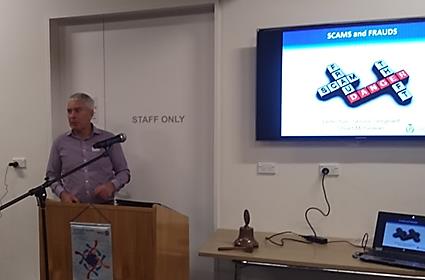How to Avoiding Frauds & Scams

Senior Sergeant Stu McGowan from the New Zealand Police gave us an insight into the various frauds and scams in New Zealand and how to avoid getting sucked in.
Stu began by noting that the target of frauds and scams is our property, identity or wealth and explained that there is a lot of information out there to help ensure that we don’t get taken in.
New Zealanders are the most likely people to get scammed with over 21% of us having experienced it with the most common segment taken in being young white males.
Most come from overseas and, once money is lost, it is very difficult to get it back explained Stu. The most common ones come from overseas offering free app downloads that gently take money out of your accounts with the majority of funds obtained being used to fund terrorism.
Others include credit card offers and some door to door visits.
Some of the most common ones most of us have seen include lottery wins and cheap holiday offers that require you to pay up first to receive them. Another common one is an offer to fix your computer that asks you to allow them to log on. Once done they can then download a program that enables them to monitor all keystrokes including account numbers and passwords when using internet banking. Very realistic bank site ones are also becoming more realistic and sophisticated. “You need to remember that banks will never ask for your login information so delete any content that does so” recommended Stu.
“Another one offers great returns for investments. If you get caught with this one you need to stop all contact and payments” advised Stu. One case he is aware of resulted in the victim losing $280,000.
Stu suggested that if you are concerned about an offer you receive, Googling the name of the company can often result in it being identified as a scam.
Another common one involves affinity or romance. “We tend to accept people at face value which is risky” said Stu. Once sucked in, the perpetrator asks for money for various reasons including having lost a job, needing to help a sick relative or to travel to NZ to join you. In one case a person lost $85,000 before realising they had been tricked.
A more sophisticated one involved 2 people from overseas coming into NZ via Australia and buying thousands of dollars’ worth of goods using cloned credit cards via amended ATMs. One purchase was for a $30,000 ring and another for $70,000 from one store that required them to use numerous cloned cards with the retailers not seeing this as unusual. Luckily they were caught at the airport.
In closing, Stu suggested the following two key ways we can avoid being scammed:
- Never click on any links or attachments that ask you to log in and verify one of your passwords.
- Double check that a person, offer or company is legitimate before providing details or payment.
If you think you might be or have been tricked check out Netsafe for tips and advice, Cert NZ and NZ Police to report a cyber security problem.
And remember the golden rule:
“If it is too good to be true then it probably is.”
Nick thanked Stu for his informative presentation on the various frauds & scams out there and how to stay safe.